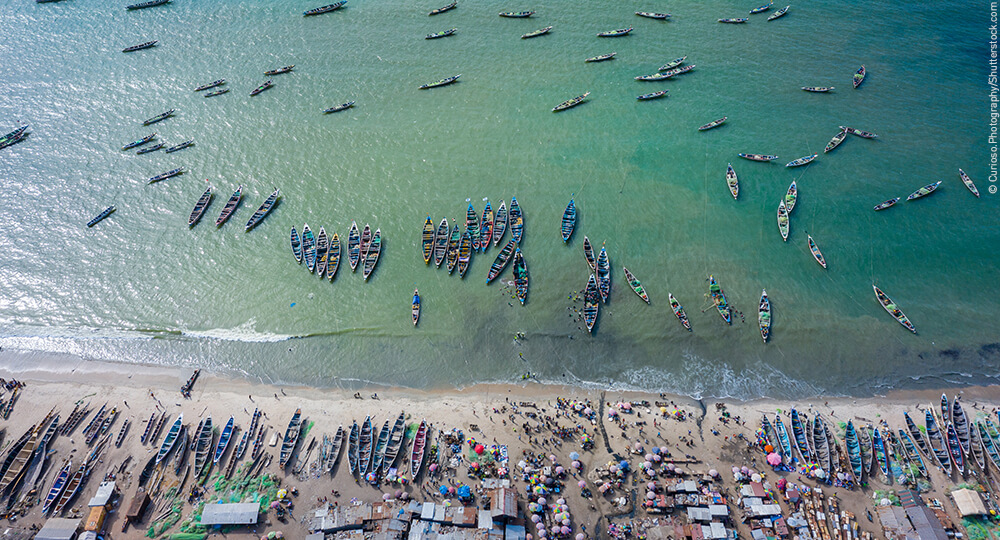
وبناء على عملية تشاركية قوية بدأت في عام 2018، توفر خارطة طريق عقد المحيطات في أفريقيا إطارا منسقا لتخطيط علوم المحيطات واستيعابها، وأساسا لرصد تحقيق أولويات العقد ونتائجه في المنطقة.
مع أكثر من 30،000 كم من الساحل وأكثر من 1.5 مليون كم2 من المناطق الاقتصادية الخالصة (EEZs) ، تعتمد البلدان الأفريقية في القارة والدول الجزرية المجاورة اعتمادا كبيرا على المحيط وموارده الغنية. وتدعم المحيطات سبل العيش الساحلية، والأمن الغذائي، وتحمي المناطق الساحلية الضعيفة من الظواهر الجوية والمناخية المتطرفة؛ ومع ذلك، فهي تتعرض حاليا لتهديد متزايد.
وتوفر خارطة طريق عقد المحيطات في أفريقيا، التي أطلقت بمناسبة المؤتمر الأفريقي المعني بتحديد الأولويات وتنمية الشراكات لعقد الأمم المتحدة لعلوم المحيطات من أجل التنمية المستدامة (10-12 أيار/مايو 2022)، رؤية طموحة وخطة قوية لمختلف أصحاب المصلحة للاجتماع حول مجموعة مشتركة من الأولويات لتنفيذ العقد على المستوى القاري الأفريقي وفي الدول الجزرية المجاورة.
وقال فلاديمير ريابينين، الأمين التنفيذي للجنة الأوقيانوغرافية الحكومية الدولية التابعة لليونسكو: "يتيح عقد المحيطات فرصة لبناء مستقبل أكثر إنصافا ومرونة وقائمة على المعرفة وازدهارا لأفريقيا في وئام مع الطبيعة".
بدأت خلال المرحلة التحضيرية لعقد المحيطات في عام 2018 ، وقادت اللجنة الأوقيانوغرافية الحكومية الدولية واليونسكو عملية تطوير خارطة الطريق الأفريقية في دورها كمنسق لعقد الأمم المتحدة لعلوم المحيطات من أجل التنمية المستدامة ورابطة العلوم البحرية في غرب المحيط الهندي (WIOMSA). ويستند التقرير إلى تحليل الفجوة الإقليمية الذي أنجز في عام 2021 وسلسلة من ورش العمل عبر الإنترنت لأصحاب المصلحة المتعددين في أوائل عام 2022. واستنادا إلى المواد والتعليقات التي تم جمعها، حددت اللجنة الأوقيانوغرافية الحكومية الدولية - اليونسكو والرابطة العالمية لجمعيات المحاسبين القانونيين والشركاء الإقليميين الآخرين الثغرات العلمية الإقليمية الرئيسية، واحتياجات تنمية القدرات، والأولويات الشاملة.
وتوجت هذه العملية الواسعة لإشراك أصحاب المصلحة بتسعة إجراءات مستقبلية ذات أولوية في العقد.
- الإدارة المستدامة للمحيطات في أفريقيا
- المحيطات وصحة الإنسان في أفريقيا
- إطلاق العنان لإمكانات الكربون الأزرق في أفريقيا
- مصائد الأسماك ومصايد الأسماك غير المشروعة وغير المبلغ عنها وغير المنظمة في أفريقيا
- تعزيز نظم الإنذار المبكر بالأخطار المتعددة وقدرة المجتمعات المحلية على الصمود
- نظم رصد المحيطات والتنبؤ بها في أفريقيا
- التوأم الرقمي لأفريقيا - إنشاء مركز معرفة للمحيطات الأفريقية
- تعزيز قدرات ومهارات المهنيين الأفارقة في مجال المحيطات في بداية حياتهم المهنية (ECOPs)
- البرنامج الإقليمي لمحو الأمية في المحيطات من أجل أفريقيا
والغرض من هذه القائمة المستهدفة والملموسة هو تيسير المناقشات، وتعزيز الأفكار، وحفز الشراكات، وحفز الالتزام بالشروع في عملية التصميم المشترك والتطوير المشترك لبرامج العقد ومشاريعه، حيث أن إحدى الثغرات الرئيسية التي تم تحديدها في البداية تتعلق بالتمثيل الناقص للمنظمات الأفريقية في الإجراءات المعتمدة.
والهدف النهائي لخارطة الطريق، التي أمكن تحقيقها بدعم سخي من حكومتي النرويج والسويد، هو إيجاد حلول قائمة على المحيطات ناتجة عن أفضل المعارف المتاحة، بما في ذلك المعارف الأصلية والمحلية، وبمساعدة الابتكار والتكنولوجيا وتنمية القدرات. وسيسهم ذلك في تهيئة بيئة مواتية لتحقيق التنمية المستدامة في أفريقيا ورؤية عقد المحيطات - "العلم الذي نحتاجه للمحيطات التي نريدها".
انقر هنا لقراءة خارطة طريق عقد المحيط في أفريقيا.
لمزيد من المعلومات، يرجى الاتصال ب:
فريق الاتصالات المعني بعقد المحيط (oceandecade.comms@unesco.org)
***
حول عقد المحيطات:
يسعى عقد الأمم المتحدة لعلوم المحيطات من أجل التنمية المستدامة (2021-2030) (عقد المحيطات) الذي أعلنته الجمعية العامة للأمم المتحدة في عام 2017 إلى تحفيز علوم المحيطات وتوليد المعرفة لعكس اتجاه تدهور حالة نظام المحيطات وتحفيز فرص جديدة للتنمية المستدامة لهذا النظام الإيكولوجي البحري الضخم. إن رؤية عقد المحيطات هي "العلم الذي نحتاجه للمحيطات التي نريدها". ويوفر عقد المحيطات إطارا لعقد الاجتماعات للعلماء وأصحاب المصلحة من مختلف القطاعات لتطوير المعارف العلمية والشراكات اللازمة لتسريع وتسخير التقدم المحرز في علوم المحيطات من أجل تحقيق فهم أفضل لنظام المحيطات، وتقديم حلول قائمة على العلم لتحقيق خطة عام 2030. وكلفت الجمعية العامة للأمم المتحدة اللجنة الأوقيانوغرافية الحكومية الدولية التابعة لليونسكو بتنسيق الأعمال التحضيرية للعقد وتنفيذه.
نبذة عن اللجنة الأولمبية الدولية واليونسكو:
10 - وتشجع اللجنة الأوقيانوغرافية الحكومية الدولية التابعة لليونسكو التعاون الدولي في مجال العلوم البحرية لتحسين إدارة المحيطات، والساحل، والموارد البحرية. وتمكن اللجنة الدولية للمحيطات والدول الأعضاء فيها، التي تضم 150 دولة، من العمل معا من خلال تنسيق البرامج في مجالات تنمية القدرات، ورصد المحيطات وخدماتها، وعلوم المحيطات، والإنذار بأمواج تسونامي. ويساهم عمل اللجنة في مهمة اليونسكو في تعزيز النهوض بالعلم وتطبيقاته لتطوير المعرفة والقدرة، وهو أمر أساسي للتقدم الاقتصادي والاجتماعي، وأساس السلام والتنمية المستدامة.